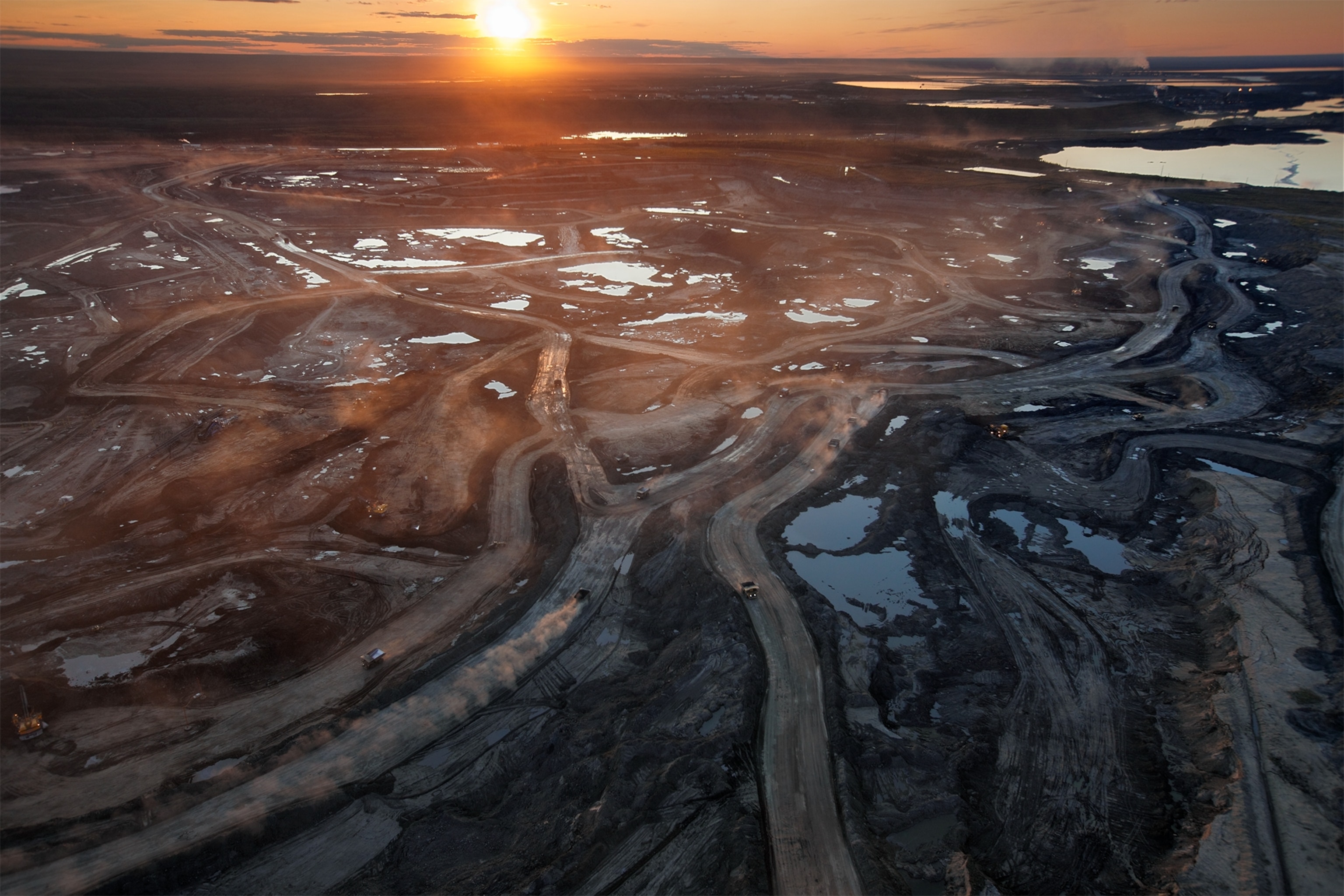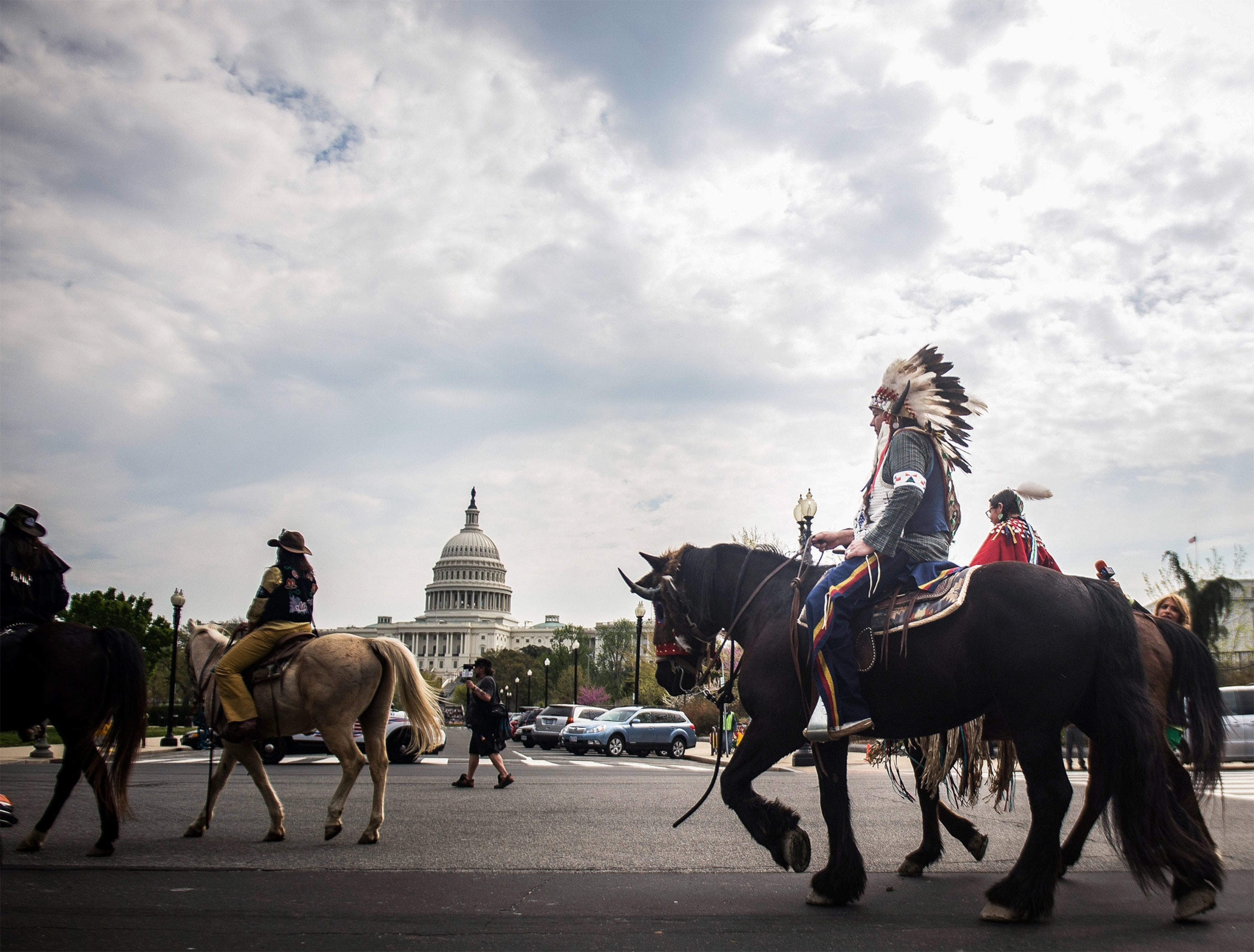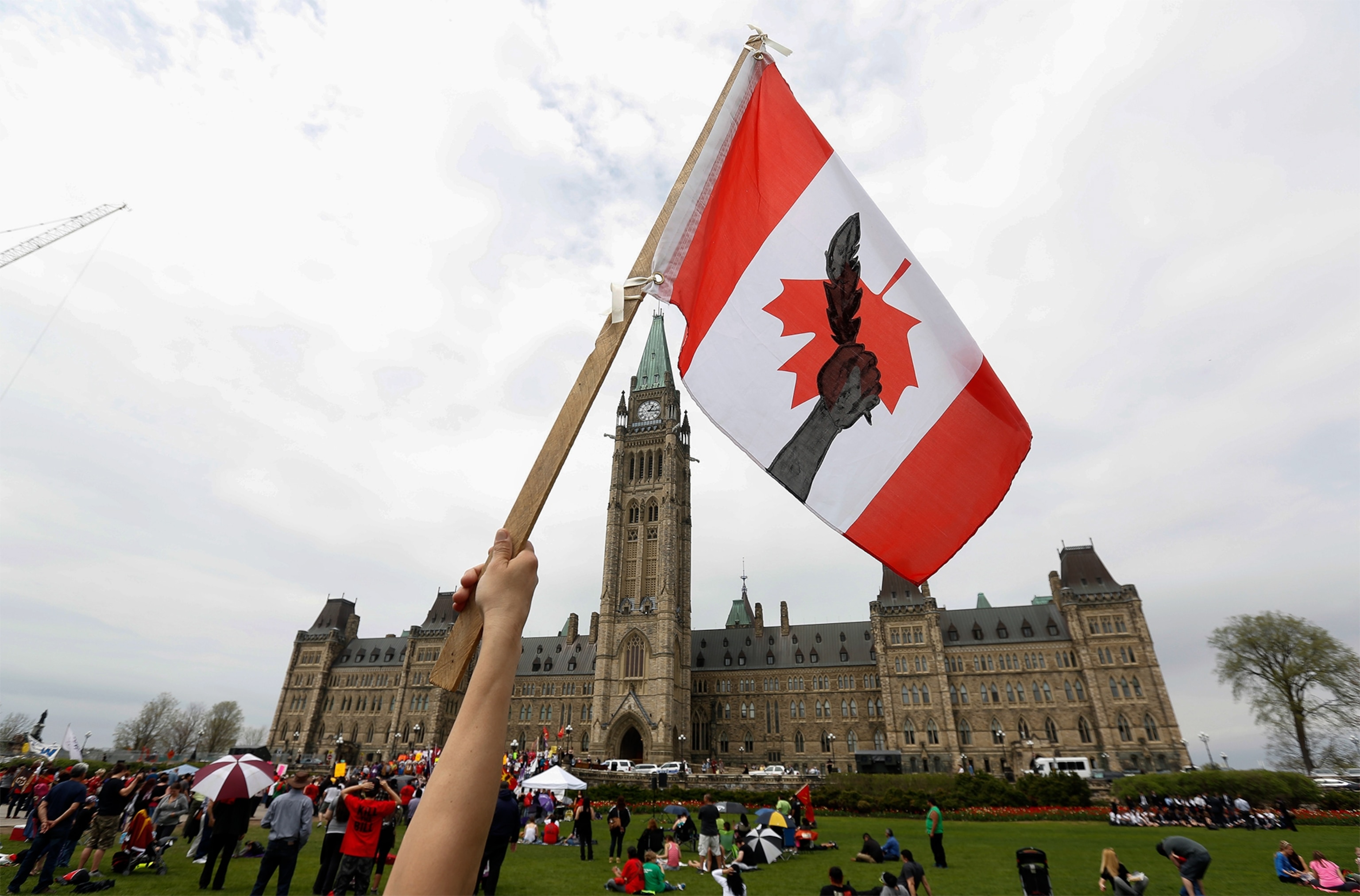
Naomi Klein on How Canada's First Nations Can Take on the Oil Industry and Win
Indigenous peoples may be key to combating climate change, author says.
She's glamorous and brilliant, a mother and a social critic. She has appeared in Vogue and marched with Occupy Wall Street protesters. Her books have been international best sellers—and channeled the zeitgeist, illuminating issues we thought we knew about but didn't.
The New York Times has compared Naomi Klein's new book, This Changes Everything, to Rachel Carson's Silent Spring. In it, Naomi Klein rips up the rule book on climate change—and offers a radical new vision of hope for the future.
Talking from her home in Toronto, she explains how becoming a mother changed her perspective, why Canada's First Nations may be best placed to halt the Keystone XL pipeline, and what kind of world she hopes her son will grow up in.
Your previous books have been critiques of capitalism. What made you want to write about climate change? And how are the two linked?
It flowed quite organically from my last book, The Shock Doctrine, which was about how disasters of various kinds are used to push through unpopular policies that deepen inequality and consolidate wealth in the hands of the few.
I ended that book with Hurricane Katrina. So I was already focused on climate change in many ways, but I was in a state of despair about it. Then I had a conversation with a Bolivian government official who laid out a vision for how responding to climate change could be the antithesis of what I described in The Shock Doctrine—how it could lead to greater equality between nations and within nations. And that's when I decided to embark on this project.
Could you expand on that connection between economic injustice and climate change?
Anyone who has attended a climate change conference knows that the really pitched battles come down to economic justice—the right of developing countries to pull themselves out of poverty and the responsibility of wealthier nations, whose wealth was accumulated in large part by burning greenhouse gases, to help poor countries leapfrog over fossil fuels.
There are also issues of historical responsibility—how some countries have been burning fossil fuels for a lot longer than other countries—which will form the basis for who cuts when.
These issues of equality and historical responsibility were at the heart of our failure to respond to climate change. It's why the U.S. didn't ratify the Kyoto Protocol. It was seen as unfair for the U.S. and for other wealthy countries to lead the way on emissions reductions, while poorer countries were given more atmospheric space to develop and then transition. You really can't avoid the inequality question if you're serious about cutting emissions. It's at the heart of it.

You offer a radical critique of the way we approach climate change. What have we been doing wrong?
I think one of the things we've done wrong is to treat this as a technological challenge. Reams have been written about what technologies can get us off carbon and what is the precise policy cocktail that will transition us away from fossil fuels. But there's been very little attention paid to the ideological climate in which all of this is playing out. What my book brings to the discussion is a historical perspective.
A large part of the reason we've failed is that this crisis landed on our collective laps at the worst possible moment in our ideological evolution. That moment was the late 1980s. Climate scientists were aware of it well before then. But 1988 was a watershed. It was the year the Intergovernmental Panel on Climate Change was convened, the year that James Hansen testified on Capitol Hill.
It was also the ascendant moment of what Joseph Stiglitz called market fundamentalism—the idea that governments should just get out of the way and unleash the powers of the market. If we look at the major barrier to decisive climate action, it's been this idea that there's something wrong with regulating markets, telling corporations what they should and shouldn't do. All of this has been denigrated as command-and-control regulation. That meant instead of regulation, you created emissions "markets" like cap and trade.
Instead of addressing people as political actors and talking about what we can do collectively in the face of this vast collective crisis, green groups emphasized individual consumption, because that also fits into the logic of just seeing people as consumers, as opposed to citizens. We were told, Just change your lightbulbs and buy green products.
But in the end, I think this made people feel helpless, because individual action in the face of such a vast problem is a drop in the ocean. Only when we act collectively can we make a difference.
You say that this is the hardest book you have ever written. Why?
It was hard on a personal level in the sense that it was just really depressing for the first while. [Laughs] I was also pregnant during part of it, and that probably made me extra tired. I write a new nonfiction book about every seven years. Part of that is just becoming familiar with the subject. And this was a new field for me, so there was a steep learning curve.
I also write books so they'll be useful to movements. For instance, my first book, No Logo, was picked up by the antiglobalization movement. But for the first three years I was writing this book, I didn't see a movement that was going to pick it up. I kept saying to this friend of mine, "I don't know who I am writing this book for."
Things started to shift as a more grassroots climate movement started to emerge, fighting projects like the Keystone XL pipeline. And I finally felt, OK, I know who this book is for, and I have to get it out. Then it just poured out of me.

The country of your birth, Canada, is in a resources race to the Arctic. What's your view of this? And what can be done to safeguard the North Pole?
My country is really in trouble. One of the most important things to help it would be for Stephen Harper, our conservative prime minister, to lose the upcoming election. They have basically one idea how to develop Canada's economy—and that's to tear up the country. To dig lots and lots of holes. They don't deny climate change. They just see it as an opportunity to drill for more oil and gas or build a pipeline through the frozen north to get tar sands bitumen out of Alberta. They've also shredded Canada's commitments under the Kyoto Protocol.
Most Canadians are horrified about what our government is doing, but they feel helpless. This has lead to the realization that First Nations land rights, which have been very strongly affirmed by Canada's supreme court, are our best chance of standing in the way of our government's plans to push through these incredibly destructive extractive projects.
For instance, the planned expansion of tar sands mining is being challenged in the courts as violations of treaty rights. In the U.S, the Navajo's Black Mesa Water Coalition has managed to shut down a coal power plant and reduce coal mining on their land.
(See "Can Coal Ever Be Clean?")
It's not just in North America. It's true in the Amazon. It's true in the Niger Delta. Indigenous people have always been at the forefront of fossil fuel resistance and protecting their land and culture.
Tell us a bit about the woman behind the polemics. Has becoming a mother changed your view of the world?
I think becoming a mother changes everyone's view of the world. But as I write in the book, I became a mother a few years into this project. It's not that becoming a mother made me care. I often hear this idea that we are doing this for our children. As someone who didn't have children until three years ago, I used to feel excluded by that.
There are a lot of people who choose not to have kids because they care about the environment or who can't have kids. But that doesn't mean they don't care about the future. So I never quite know how to answer this question, because I feel it's quite fraught, particularly for women.
But as I write in the book, I certainly have seen the world through the eyes of a toddler—his love of the natural world, his adoration of animals. [Laughs.] As well as trucks.
There's a new round of climate talks scheduled next year in Paris. How big a setback is the Republican victory in the midterm elections? Conversely, how important is the agreement on emissions between the U.S. and China that's just been announced?
I think it remains to be seen how much the Republican victory is a setback. It also depends how important a climate legacy is to Obama. And whether the climate movement that came out with such enthusiasm in September can keep up the pressure on Obama. He has the power to say no to Keystone and protect the EPA from political meddling. It's just a question of whether he wants to—especially in the face of Senator [James] Inhofe occupying one of the most important environmental positions in the country. It can't be left to a battle between Obama and his conscience. It has to be about counterpressure from this growing movement.
As to the deal with China, the emissions that the U.S. commits to in the China deal are completely inadequate from the perspective of what climate scientists are telling us we need to do if we want to take the two-degree target seriously. We need to be cutting emissions by 8 to 10 percent per year. What this deal promises is 2.8 percent per year by 2025. And that's not good enough.
The part of the China deal I'm most excited about is to have 20 percent of their energy mix coming from non-fossil fuel sources by 2030 and potentially earlier. We're already seeing huge investment in clean energy in the PRC. Now they're talking about doubling their share.
You end the book with an impassioned plea for a sea change in our values. Give us a vision of the future for your son.
What I've come to understand even more since I finished writing the book is that we're up against forces with a huge amount to lose. The fossil fuel industry is a very powerful, wealthy industry, with trillions of dollars in assets. If our governments ever decided to take climate change seriously and keep the vast majority of their fossil fuel reserves in the ground, they'd be stranded. Obviously, they're going to fight really hard to protect their interests.
On the other side of the equation there are people who care about climate change. Liberals care about climate change—but not that much. It's like last on the list of the issues you care about. So there's been this passion gap. If you're up against forces with a huge amount to lose, you need to have a movement made up of people who have a huge amount to gain from action. They have to fight with as much passion as the fossil fuel industry will fight to prevent action.
But I do believe we can get to 100 percent renewable energy. I do believe that that energy can be owned and controlled overwhelmingly by our communities, with the benefits of it going to help pay for our schools and health care.
I also believe that if we're going to have a safe future for our kids, it's going to have to be in a world that's much less unequal than the world we have now. I think part of the process of getting off fossil fuels will be a process of historical reconciliation. It will have to address some of the original sins of the founders of our countries. That would be a hopeful process for my son.
Simon Worrall curates Book Talk. Follow him on Twitter or at simonworrallauthor.com.